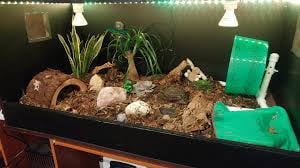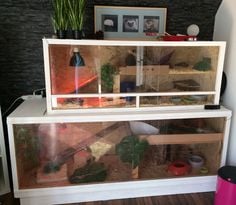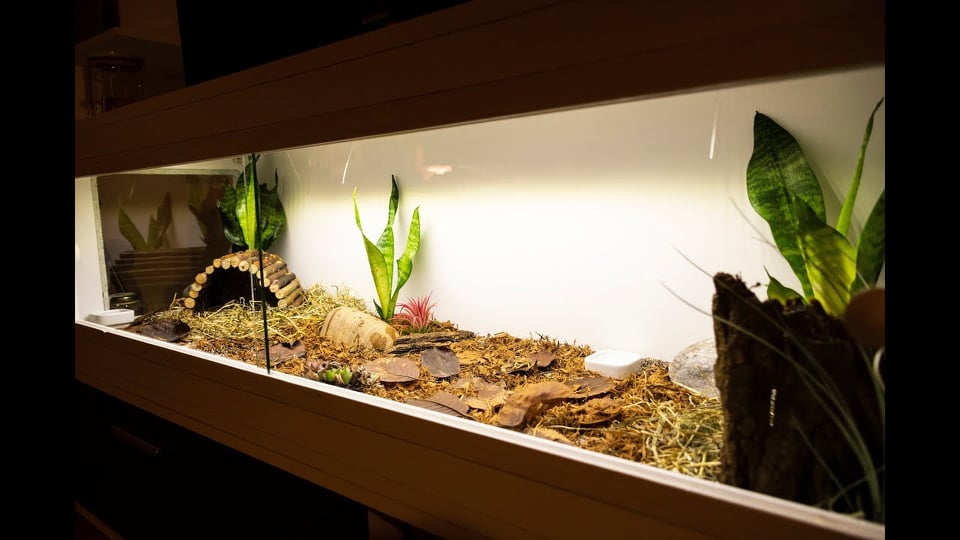General Information:
African pygmy hedgehogs are the most common species of domesticated hedgehog and are becoming increasingly popular exotic pets. Despite being popular pets, African pygmy hedgehogs have very complex needs.
They're a nocturnal and solitary species of hedgehog who eat an omnivorous diet. They belong to the order eulipotyphla; containing hedgehogs, shrews, and voles. Hedgehogs are in the family Erinaceidae.
Fun Fact:
Erinaceidae are the oldest known placental mammals still alive today. Despite this, there is still controversy amongst their phylogenetic relationship.
Hedgehogs can make great pets for some people, but they're not great pets for most people.
They live for approximately 4-6 years.
Useful Links:
Care:
Housing/Enrichment:
Before taking on an animal, one must question how they're going to provide a natural and happy life for their animal. Mimicking the natural environment of the African Pygmy Hedgehog can be a tremendous undertaking.
First, it is not at all true that hedgehogs can live happily within most rodent cages.
A hedgehog should be housed in a large enclosure such as a 6ft/2ft vivarium. As hedgehogs require an external heat source, a vivarium is ideal for this. A hedgehog's environment should be between 23-25 degrees Celcius - ensure their environment never drops below 18 degrees (temperatures too low may induce hibernation), and never exceeds 28 degrees Celcius.
A good heat source includes a 100-150W CHE (ceramic heat emitter) with a suitable guard. You'll also want to monitor the temperature with a pulse thermostat and thermometers either side of the enclsoure.
Your hedgehog must receive 12 hours of daylight and 12 hours of darkness.
Most hedgehogs are incredibly messy and you must keep their environment as clean as possible. Most people recommend a dust-free cardboard bedding or even coco soil. We discourage using fleece as it prevents them from exhibiting natural behaviours.
You must provide your hedgehog with a suitable running wheel. Our all-time favourite wheels are from Tic Tac Wheels, they have brilliant running wheels for hedgehogs. Solid wheels are better for hedgehogs as they can prevent leg trauma.
It's recommended your hedgehog has plenty of enrichment such as hides, tunnels, beds and so on. They're prey animals and don't like open space.
Useful Links:
African pygmy hedgehogs are the most common species of domesticated hedgehog and are becoming increasingly popular exotic pets. Despite being popular pets, African pygmy hedgehogs have very complex needs.
They're a nocturnal and solitary species of hedgehog who eat an omnivorous diet. They belong to the order eulipotyphla; containing hedgehogs, shrews, and voles. Hedgehogs are in the family Erinaceidae.
Fun Fact:
Erinaceidae are the oldest known placental mammals still alive today. Despite this, there is still controversy amongst their phylogenetic relationship.
Hedgehogs can make great pets for some people, but they're not great pets for most people.
They live for approximately 4-6 years.
Useful Links:
Care:
Housing/Enrichment:
Before taking on an animal, one must question how they're going to provide a natural and happy life for their animal. Mimicking the natural environment of the African Pygmy Hedgehog can be a tremendous undertaking.
First, it is not at all true that hedgehogs can live happily within most rodent cages.
A hedgehog should be housed in a large enclosure such as a 6ft/2ft vivarium. As hedgehogs require an external heat source, a vivarium is ideal for this. A hedgehog's environment should be between 23-25 degrees Celcius - ensure their environment never drops below 18 degrees (temperatures too low may induce hibernation), and never exceeds 28 degrees Celcius.
A good heat source includes a 100-150W CHE (ceramic heat emitter) with a suitable guard. You'll also want to monitor the temperature with a pulse thermostat and thermometers either side of the enclsoure.
Your hedgehog must receive 12 hours of daylight and 12 hours of darkness.
Most hedgehogs are incredibly messy and you must keep their environment as clean as possible. Most people recommend a dust-free cardboard bedding or even coco soil. We discourage using fleece as it prevents them from exhibiting natural behaviours.
You must provide your hedgehog with a suitable running wheel. Our all-time favourite wheels are from Tic Tac Wheels, they have brilliant running wheels for hedgehogs. Solid wheels are better for hedgehogs as they can prevent leg trauma.
It's recommended your hedgehog has plenty of enrichment such as hides, tunnels, beds and so on. They're prey animals and don't like open space.
Useful Links:
- lafeber.com/vet/basic-information-for-hedgehogs/
- provivs.co.uk/180cm-x-60cm-x-60cm--72x24x24-flat-packed-vivarium-6ft-85-p.asp?_=&variantid=510&gclid=Cj0KCQjw8vqGBhC_ARIsADMSd1DQcuABlIFougbWX7AOXXLxBSXbF6AK2m0hgOZgQ3ZdKM79nxOEXxoaAuwQEALw_wcB
- www.tictacwheels.co.uk/bucket-wheels
- www.reptilecentre.com/info-pygmy-hedgehog-setups
- www.internetreptile.com/internet-reptile-cork-bark-large-tube-short/?utm_medium=cpc&gclid=Cj0KCQjw8vqGBhC_ARIsADMSd1CATLawMHwmHaM-WUi4AYkssGbkF0EXsEs8xfC2F8LVBUdXyht8m9saArTvEALw_wcB#fo_c=2683&fo_k=f8949c8529f07b7f44a1437f60b58452&fo_s=gplauk
Socialising:
Hedgehogs are solitary creatures and, for the most part, they shouldn't cohabit. Some people report young adults from the same litter living well together, but your hedgehog is best housed alone.
Some owners report that their hedgehog is remarkably grouchy, which can prove to be problematic. As prey animals, hedgehogs, when they're threatened, can make their quills stand on end and curl into a ball - which can be painful when you're holding them. Hedgehogs can bite but rarely do so. Their natural defence mechanism is resorting to using their quills.
The best way to socialise your hedgehog is to simply socialise with them frequently. If you want a very cuddly and social pet who deliberately seeks your attention, it's unlikely you'll find this in a hedgehog.
Hedgehogs, as we've mentioned, are usually very messy pets. When running (which they do a lot) will urinate and defecate. When domestic hedgehogs are running, they're usually running on their wheel. This means they often stand in their urine and faeces and create something that is informally referred to as 'poo-boots' (it is exactly like what it sounds). You must keep your hedgehog as clean as possible and gently bathe them when needed.
Needless to say, if you're not a fan of various bodily fluids, a hedgehog may not be for you.
Diet:
As monogastric omnivorous, hedgehogs require both plant and animal materials to stay healthy. Although they're omnivores, they're mostly insectivorous. They're naturally nocturnal foragers so feeding them at night will be beneficial.
A pygmy hedgehog's natural diet should contain a variety of insects (ideally live as this encourages natural hunting behaviours), high-quality cat food/kibble that meets hedgehogs dietary needs, healthy treats, and a small amount of fruit and vegetables. Live feeding insects can encourage exercise to prevent obesity; a common nutritional disease in pet hedgehogs.
Their cat food should contain:
Some owners will also supplement flaxseed oil once a week in their hedgehogs food to promote healthy skin.
The BSAVA Manual for Exotic Pets (fifth edition) mentions a diet high in larval insects can cause a calcium/phosphorus imbalance which may lead to metabolic bone disease.
Useful Links:
Common Health Issues:
African pygmy hedgehogs suffer from a wide range of diseases and it’s extremely important you learn common diseases as well as the signs and symptoms of these diseases so you know what to look out for. Here are some diseases APH are prone to:
Hedgehogs are solitary creatures and, for the most part, they shouldn't cohabit. Some people report young adults from the same litter living well together, but your hedgehog is best housed alone.
Some owners report that their hedgehog is remarkably grouchy, which can prove to be problematic. As prey animals, hedgehogs, when they're threatened, can make their quills stand on end and curl into a ball - which can be painful when you're holding them. Hedgehogs can bite but rarely do so. Their natural defence mechanism is resorting to using their quills.
The best way to socialise your hedgehog is to simply socialise with them frequently. If you want a very cuddly and social pet who deliberately seeks your attention, it's unlikely you'll find this in a hedgehog.
Hedgehogs, as we've mentioned, are usually very messy pets. When running (which they do a lot) will urinate and defecate. When domestic hedgehogs are running, they're usually running on their wheel. This means they often stand in their urine and faeces and create something that is informally referred to as 'poo-boots' (it is exactly like what it sounds). You must keep your hedgehog as clean as possible and gently bathe them when needed.
Needless to say, if you're not a fan of various bodily fluids, a hedgehog may not be for you.
Diet:
As monogastric omnivorous, hedgehogs require both plant and animal materials to stay healthy. Although they're omnivores, they're mostly insectivorous. They're naturally nocturnal foragers so feeding them at night will be beneficial.
A pygmy hedgehog's natural diet should contain a variety of insects (ideally live as this encourages natural hunting behaviours), high-quality cat food/kibble that meets hedgehogs dietary needs, healthy treats, and a small amount of fruit and vegetables. Live feeding insects can encourage exercise to prevent obesity; a common nutritional disease in pet hedgehogs.
Their cat food should contain:
- 30-35% protein
- 10-15% fat
Some owners will also supplement flaxseed oil once a week in their hedgehogs food to promote healthy skin.
The BSAVA Manual for Exotic Pets (fifth edition) mentions a diet high in larval insects can cause a calcium/phosphorus imbalance which may lead to metabolic bone disease.
Useful Links:
Common Health Issues:
African pygmy hedgehogs suffer from a wide range of diseases and it’s extremely important you learn common diseases as well as the signs and symptoms of these diseases so you know what to look out for. Here are some diseases APH are prone to:
- Dental Disease: African pygmy hedgehogs have 36 cuspidate teeth which helps them consume their insectivorous diet. Unfortunately, that means they can be prone to periodontal disease and prophylactic dental care should be a part of your daily care for your hedgehog; consider things like Plaque Off to prevent tartar build up. Hedgehog’s teeth can also fracture and they may develop oral abscesses too. Common symptoms include: Ptyalism (drooling), halitosis (bad breath), anorexia (not wanting to eat), and weight loss. An oral exam should be performed at annual vet check ups.
- Gastrointestinal Disease: Salmonella is commonly seen in hedgehogs and this is also zoonotic. Symptoms will includel: weight loss, mucoid diarrhoea, and secondary dehydration. Fecal cultures can be beneficial for diagnosis and it’s important you seek urgent veterinary attention.
- Uterine Neoplasia: Uterine tumours can occur even in young hedeghogs. Any signs of vaginal discharge should be urgently seen to at the vets and a total hysterectomy is usual advised in these cases.
- Neurological Disease: African pygmy hedgehogs may display neurological symptoms secondary to issues such has liver issues, torpor, aural disease, and many other causes. You must go to a vet if you see any neurological abnormalities in your hedgehog.
- ‘Wobbly Hog Syndrome’: WHS has many myths and misconceptions surrounding the disease, so it’s important you seek advice from a qualified medical professional if you believe you’re seeing symptoms of WHS. It’s characterized as a neurodegenerative disease and symptoms include: weight loss, ataxia, paralysis and, eventually, death. Onset can vary but most hedgehogs seem to pass away within 15 months of initial onset of disease.



